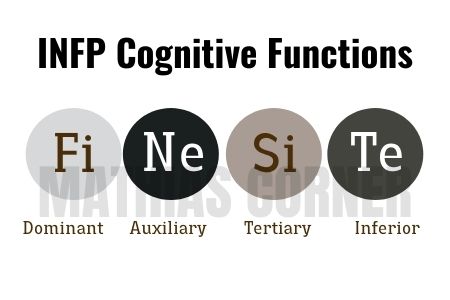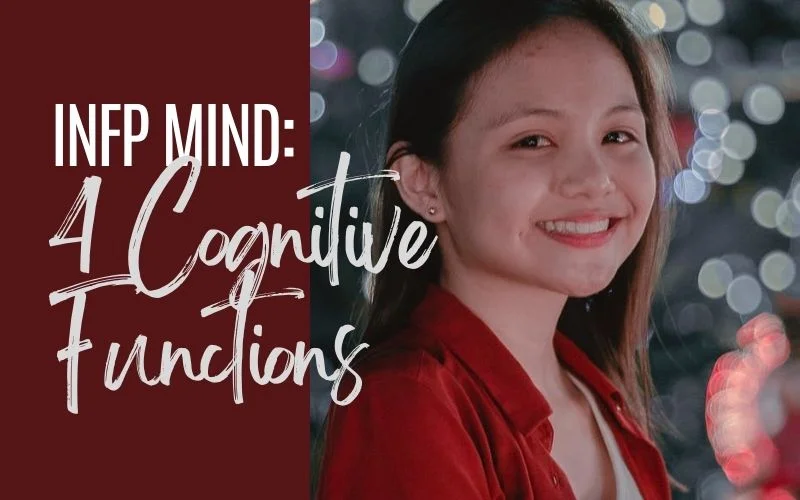INFPs are those goofy friends who are likely to smile at everything. They’re light-hearted but ooze with sensitivity in their words and would always treat people with kindness. These peace-revering spirits seem like they never get angry at all.
But contrary to what they show to the world, INFPs have a constant battle within themselves. Behind the scenes are doubts, anxiety, emptiness, and the struggle to find their purpose.
The Internet stereotypes them as the “saddest” personality type. But can you really recognize an INFP when you meet one?
They’re pretty hard to read. I’m an INFP, but I haven’t recognized my goofy INFP friends immediately, not until I let them take the test.
Truly, there’s more than what meets the eye.
Curious how the INFP mind works? In this post, let’s zoom in and take a peek at how INFPs think and process the world around them.
Who are the INFPs?
A short overview – INFP stands for Introverted-iNtuitive-Feeling-Perceiving. They are also known as the Mediators, Healers, and Dreamers of the Myers-Briggs 16 personalities.
They’re free spirits who have a strong sense of morality, are always in search of meaning, and pursue authenticity in all ways. They are reserved, avoidant of conflicts, compassionate, and empathetic towards people.
INFP Cognitive Functions in Action

Now, digging deeper, how does INFP mind work?
To have a clearer view of how INFPs think, we must understand their thought process, their flow, and understand the 4 cognitive functions (ego stack) that lead an INFP:
These are:
- Dominant Function: Introverted Feeling (Fi)
- Auxiliary Function: Extraverted iNtuition (Ne)
- Tertiary Function: Introverted Sensing (Si)
- Inferior Function: Extraverted Thinking (Te)
The Dominant function is the most utilized cognitive process, while the least used among the ego stack is the Inferior function. Now, let’s start identifying how INFP uses each function and how they reflect it to their inner and external world.
INFP Dominant Function: Introverted Feeling (Fi)
The dominant function is the way a person sees the world in an unconscious manner. If you’re left in a crowd of an unknown city, and a stranger talks to you, what does your mind think as a default?
Initially, an INFP would feel the need to guard themselves instead of engaging for too long. I don’t know about other INFPs, but I’m most cautious whenever I’m outside – watchful of my belongings and entirely conscious of safety. And why is that?
For INFPs, they evaluate the situation using the Introverted Feeling (Fi) function. Having Fi as their dominant renders INFP with a strong attachment to morality and judge the surroundings against their own values, ideals, and feelings.
That said, the Mediators are always behind the lenses of “feeling good or feeling bad”. They face the world unconsciously asking, “do I feel good about this, or do I feel something bad’s gonna happen?” No wonder INFPs always have their guards up.
How does introverted Feeling (Fi) affect INFP’s everyday life?

Honestly, INFPs are always torn between “what I feel is right” and “what people say is right”. But contrary to the misconception, INFPs aren’t as irrational as people thought.
Here’s what Introverted Feeling looks like:
INFPs can think logically and know the reasonable response to circumstances. But being an Fi-dominant, INFPs are drawn to follow their moral compass.
I’ve heard people tell me, “Why don’t you wait a year more before leaving?” whenever I wanted to quit jobs. I tried. But for Fi-dominants who have decided that the situation doesn’t fit their values, continuing further ruins us with daily anxiety, indifference, or even depression. I’m not even exaggerating.
Going against our feelings causes extensive friction.
Recently, I had a communication with an acquaintance who somehow “obliged” me to do her a favor. Long story short, I didn’t like her behavior, yet she was pushy, and I can’t decline because her request underlies a tradition.
I strongly felt my Fi at work that time. I was so anxious that I even cried before saying yes.
It’s a real burden whenever we go against our beliefs. It’s like, you know what to do – saying yes wouldn’t actually hurt us – yet our feelings say otherwise.
Truly, being an Fi-dominant is internally ruthless and can lead to INFP’s dark sides.
Related Post: INFP Career: Finding the Right Job for INFP
Moreover, INFPs are tagged as “the sad and emotional” personalities since they are suppressed people who are forced to follow social norms and structure. As free spirits, I guarantee, they always wanted to break away.
INFP traits due to Fi:
- Authentic. They are guided by their moral compass.
- Aloof. They would rather be alone than fit in a group they don’t resonate with.
- Childlike. They feel overflowing excitement and display a childlike behavior toward things that interests them.
- Extroverted when comfortable. They are goofy and loud only with close friends.
- Feeling unfulfilled. They tend to quit jobs that don’t resonate with their values
- Guarded. Only a few people have the ticket to their true selves – mostly are friends who carry the same values and principles.
- Nonconformists. Don’t easily get peer-pressured since they’re more loyal to their values.
- Indecisive. Would cancel or reschedule plans because they’re no longer feeling hyped about it.
- Avoidant. Blocking and ignoring people they dislike. They don’t put up to anyone’s “bad” behavior.
You may also like: INFP Indecisiveness: Why Can’t INFPs Make up their Mind?
INFP Auxiliary Function: Extraverted iNtuition (Ne)
I love Ne – the savior from the complex life of being an Fi-dominant, the protagonist of the INFP mind.
Extraverted iNtuition (Ne) allows us to find patterns, make sense of abstract ideas, and generate concepts. It’s a forward-looking function where INFPs can branch a single idea into multiple possibilities.
How does extraverted iNtuition (Ne) affect INFP’s everyday life?

Dig deep into INFPs lives and you’ll discover a splendid creative life. These free spirits effortlessly connect to arts, writing, acting, and other creative interests.
Furthermore, INFPs are idealists who never run out of visions and plans. Their randomness, interest-hopping, and even job-hopping are fruits of their playful and imaginative auxiliary function.
With Ne, INFPs acquire a rich and expanding breadth of knowledge. Their curiosity and unwavering will to start new projects later drive them to be wise people and jacks-of-all-trades.
Although INFPs have a hard time being consistent, people would be surprised by how much information INFPs have collected in the past years which leads them to be qualified mentors to guide other people.
But on the downside, too much idealism makes INFPs unfocused. Since they are talented, they also feel like all paths are their calling. Surely, it infuriates INFPs.
Nonetheless, INFPs are late bloomers. They visualize ideas, try them, and sooner or later, these trials-and-errors will narrow down the INFP’s options into a path that adheres and resonates to their morals, desires, and standards.
INFP traits due to Ne:
- Curious; their research getting farther and farther away from the main topic.
- Project starters
- Spontaneous; setting and canceling plans
- Optimistic and forward-looking
- Open for opportunities
- Idea generators
INFP Tertiary Function: Introverted Sensing (Si)
The Sensing function pertains to how we utilize the database of our experiential memories. It includes what you felt, saw, heard, touched, and tasted. You remember how you fixed the car, the dance moves from 7 years ago, and the lines of your favorite movie character.
With Introverted Sensing (Si) as a tertiary function, INFPs use a recollection of their past experiences to solve new problems. Old habits die hard.
How does introverted Sensing (Si) affect INFP’s everyday life?

Si-users are pretty much old-fashioned. They have an attachment to the memories of past experiences and don’t easily let go. They’re the epitome of nostalgia.
What does introverted sensing look like?
You will notice how INFPs wear the same old clothes and never rearrange their things. They’re not a fan of replacing their properties because it’s a challenge for them to transition.
Another example, INFPs feel reluctant about replacing their old phones. Took me 2 weeks before I eventually switched to a new phone. I did a lot of “cherishing the last moments” before I lent it to my sister.
An INFP once said, “It still works, why replace it?”
If you’re an INFP, I know you still buy your childhood snacks when you see one, or go to the same fast food and order the same menu over and over again. Don’t you dare deny it.
Also, games. I’m sorry to expose you but INFPs secretly play games that are too outdated – those games that peaked 5 to 10 years ago.
Moreover, INFPs find it hard to learn new skills since they always retract to their old techniques and strategies.
But on the good side, once INFPs get enough exposure to a skill, the experiential memory sinks in and they start to move in such precision that can outshine other people. It takes time, but it will be worth it.
INFP traits due to Si:
- Slow-learners; initially, INFPs find it hard to learn an all-new skill since they fall back to their old techniques.
- Efficient; yes, they are slow to learn new skills, but once they get accustomed to it, their introverted stock of memory helps them move with precision, speed, and detail.
- Multi-tasking; Long-term memory of skills is a major advantage.
- Old school; they don’t follow the trend, it must grow on them for a while.
INFP Inferior Function: Extraverted Thinking (Te)
What is inferior extraverted thinking?
INFP’s inferior function is extraverted Thinking (Te) which refers to a person’s rationale – having a set of logical reasons from an external source.
To aid INFP’s decision-making, they gather information from credible resources like reference books, documents, words from knowledgeable people, or opinions from their close friends.
How does extraverted Thinking (Te) affect INFP’s everyday life?

Since Te is positioned as an inferior, it’s not as strong as our Fi. Luckily, this function would develop later in life.
Here’s an example of not exercising Te:
As an INFP, starting new projects has always been a great drive to vent our creativity. But the mistake I did back then (and for a long time) was to not research enough and rely solely on imagination.
I worked things my way. With no facts and researches to back my ideas up, I was unaware that my strategies were already set for failure. Stupid me, I could’ve saved time by researching stronger dispositions and techniques from available resources. But I didn’t
Also, if INFPs don’t notice it yet, they often imitate new information. They re-do the advice or procedure from a book, speakers, or mentors and see for themselves how effective it is for them.
If an INFP reads, “dogs respond better to rewards rather than punishments,” they are likely to emulate the advice of giving rewards rather than punishments to their dogs. Also, they lean on following “how-tos”, especially when dealing with technicals, rather than discovering their own technique and facts from the ground up.
I must say, I’m best friends with Google now. I’ve grown so much in skills after realizing how to feed my Te and let it work for me. Makes things a lot easier.
INFP traits due to Te:
- Mirroring; they imitate gathered information and see how effective it is for themselves.
- Patient; when Te develops, INFPs start to build patience to follow procedures and embrace realistic outcomes.
- Contemplative; INFPs compare and contrast gathered information and will lean on the most effective idea.
- Probing; they research for proven and tested ways to validate how effective their strategies are.
Conclusion
INFPs may be misunderstood. But on a deeper level, we’re all individuals who carry distinct preferences, gifts, and lifestyles. These reserved mediators have formidable strengths on their own
To people with INFPs in their life, understanding INFP’s cognitive functions surely help comprehend why INFPs do what they do.
As for INFPs, I’ve always said this in my previous posts. Once an INFP embraces their personality, realizes what makes them tick, and improves their strengths, they will soon find themselves in a place the way they exactly wanted.
INFP’s worst battle is conforming to society, however, you can always find a sweet spot between conformity and still being yourself.
Indeed, knowing how INFP think, your cognitive function processes, deciphering concretely what your values are, and dropping out from meeting people’s expectations will pave the way to be a more fulfilled and successful INFP.
INFPs are free spirits, so to be happy, you have to do life your way.
Thanks for reading, God bless! 🙂
-M.Mathias
Was this helpful? If yes, you can buy me a coffee to show your support! Thanks. 🙂
Interested in INFPs? Here are more reads for you:
- 5 Healthful Ways INFPs Overcome Procrastination
- Why Do INFP Suddenly Disappear?
- How to Spot INFP: 9 Signs You’re Talking with One
- How Do People See INFP? Is INFP Personality Good or Bad?
- How Do You Get an INFP to Fall in Love With You?
- INFP Intelligence: What Makes INFPs Smart?

